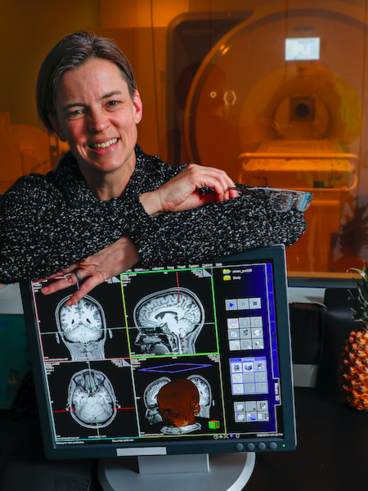Contact me by email: caolman @ umn.edu
My interests are split (roughly) evenly between fMRI methods (how high can our resolution be and what are we actually measuring?) and low-level vision (how are early visual responses modulated by scene structure and perception?).
I've been at the University of Minnesota since 2005. Before that I did my PhD work in Dan Kersten's lab; my post-doctoral work was done with Kamil Ugurbil at the University of Minnesota's Center for Magnetic Resonance Research and in David Heeger's lab at the Center for Neural Science at New York University.
Here's the list of my publications curated through the NIH's system.
As we finish off the 2023/2024 academic year, here are the things I'm celebrating:
- Another year of Classroom Partners at Murray Middle School, and a particularly excellent Fall semester offering of GCC 3026, highlighted by an inaugural field trip (20 8th graders and 8 undergraduates) to Wolf Ridge Environmental Learning Center.
- Re-inventing PSY 5063: Introduction to fMRI, centering it on my always-in-progress online textbook.
Continuing a BRAIN Initiative-funded R01 with Gordon Smith, Audrey Sederberg, and Tay Netoff studying the roles of specific inhibitory interneuron populations in providing the suppression we need for successful pattern vision.
Mentoring Philosophy
I participate in the Graduate Program in Neuroscience and in undergraduate and graduate student training through the Department of Psychology. Both programs support the publication of mentorship philosophies, so trainees can know what to expect from faculty. While I fully support this idea, I also find it challenging because my own views are continually growing and evolving. But here's what I've got so far:
- Life = self + home + work. Addition is commutative; on any given day, a different part of life might need to come first. Feel free to let us know you're taking a day off to let self or home take center stage for a while. We get it.
- Advance warning is appreciated, of course, and if you are scheduled to do a task that someone else is relying on, let them know ASAP and do what you can to find a replacement for yourself. But there are no psychophysics emergencies, and experiments can always be rescheduled. "Put on your own face mask before helping those around you."
- People are people. And to quote the immortal words of Strong Bad, "no two people are not on fire". Each person in the lab has different career and life goals; my own career and life goals are constantly changing. Each person has a different work pattern; my own work pattern changes seasonally. My goal at the outset of each mentoring relationship is to negotiate a meeting pattern that is useful and a timeframe for goal-setting that is appropriate, answering questions like those below. For mentoring relationships that last longer than a year, we'll have this conversation each year:
- Should we sit down to talk and set goals weekly, biweekly, or monthly?
- How often do you want to check in on project goals?
- How do you want to document goals and progress toward them?
- Who should be the person who starts the conversation when a goal isn't met?
- Who else is on / do you want to be on your mentorship team?
- If you're working full time, work full time. We picked jobs at a research university because we like the challenge of doing things that nobody has done before. As much as I resent this fact on some days, that means the job is hard and we will not meet our goals if we only give it a half-hearted attempt. If I notice that someone is regularly missing goals, we'll have the hard conversation: do you need to take a leave of absence because self or home needs more time than work is allowing? Do we simply need to downsize your goals; can you downsize your short-term goals while still achieving your long-term goals? Do you need a friend at work to hold you accountable for some time-management or distraction-management strategies because life is intruding on work when it shouldn't be?
- "There are worlds other than this." This is a job, not a calling; being kind to the people around you is always the most important thing.
- Cheryl is just a person. I'm keenly aware of at least some of my flaws. Now is not the time to talk about them ... but I'm working on being better. I very much appreciate it when I can get feedback about how my actions are impacting your work environment -- I know we can do better!
